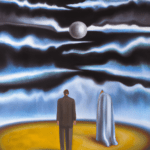Metaphysical fiction, a sub-genre of speculative fiction, is known for its exploration of the unknown and the beyond. It often deals with themes such as consciousness, reality, existence, and the nature of being. In order to tackle these abstract concepts, metaphysical fiction often draws from various philosophical ideas and theories. In this article, we will examine the role of philosophy in metaphysical fiction and how it enriches the genre.
Role of Philosophy in Fiction

Firstly, it is important to note that philosophy has been an integral part of literature for centuries. Many classic works of fiction, such as Fyodor Dostoevsky’s Crime and Punishment and Albert Camus’ The Stranger, incorporate philosophical ideas and themes. However, it is in the genre of metaphysical fiction that philosophy takes center stage. This is because metaphysical fiction often deals with abstract and complex concepts that require a deep understanding of philosophy.
One way in which philosophy enriches metaphysical fiction is through the exploration of the nature of reality. Metaphysical fiction often raises questions about the true nature of reality and what we can know about it. This is where the field of epistemology comes in. Epistemology is the branch of philosophy concerned with the nature of knowledge and belief. Many metaphysical fiction authors draw from epistemological theories to explore the limitations of human knowledge and the nature of truth.
For example, in Philip K. Dick’s novel, Ubik, the characters are living in a world where reality is constantly shifting and nothing can be trusted. The novel raises questions about the nature of reality and how we can know what is real. The characters’ experiences in the novel reflect the epistemological idea that our knowledge of the world is limited by our senses and that what we perceive as real may not actually be so.
Another area of philosophy that is often explored in metaphysical fiction is ontology, the branch of philosophy concerned with the nature of existence. Many metaphysical fiction works deal with the concept of being and what it means to exist. These works often draw from existentialist theories, which emphasize individual freedom and choice.
For example, in Haruki Murakami’s novel, Kafka on the Shore, the protagonist grapples with questions about his own existence and the nature of reality. He questions whether he is real or if he is simply a figment of his own imagination. These questions are central to existentialist philosophy, which argues that individuals must create their own meaning and purpose in life.
Another way in which philosophy enriches metaphysical fiction is through its exploration of consciousness. Consciousness is a complex and abstract concept that has been the subject of much philosophical debate. Many metaphysical fiction works draw from theories of consciousness to explore questions about the mind and the self.
For example, in William Gibson’s novel, Neuromancer, the characters navigate a virtual reality that blurs the line between the physical and the digital. The novel raises questions about the nature of consciousness and what it means to be human. The characters in the novel grapple with the idea that their consciousness may be nothing more than lines of code in a computer program.
In addition to these philosophical ideas, metaphysical fiction often draws from various spiritual and mystical traditions. This is because many spiritual and mystical traditions deal with questions about the nature of reality and the existence of the divine. These traditions can add a deeper level of meaning and symbolism to metaphysical fiction.
For example, in Paulo Coelho’s novel, The Alchemist, the protagonist embarks on a journey to discover the meaning of life and his own personal legend. The novel draws heavily from alchemical and mystical traditions to explore questions about the nature of reality and the purpose of life.
Philosophy plays a crucial role in the development and enrichment of metaphysical fiction. By drawing from various philosophical theories and ideas, metaphysical fiction is able to explore abstract and complex concepts in a meaningful and thought-provoking way. The genre raises important questions about the nature of reality, existence, and consciousness, and philosophy provides a framework for exploring these ideas.
Additionally, the use of philosophical ideas and traditions in metaphysical fiction can also make the works more accessible to readers. For many people, philosophy can be an intimidating and difficult subject to engage with. However, when these ideas are presented within the context of a narrative, they become more tangible and relatable.
Moreover, the use of philosophical ideas in metaphysical fiction can also make the genre more culturally and historically relevant. Many philosophical ideas have shaped human history and culture, and by drawing from these ideas, metaphysical fiction can add depth and meaning to its themes and concepts.
The role of philosophy in metaphysical fiction is essential in creating works that explore complex and abstract concepts. By drawing from various philosophical ideas and theories, authors are able to create narratives that raise important questions about the nature of reality, existence, and consciousness. These works not only provide intellectual stimulation but also offer a deeper understanding of the human experience.
Keywords: metaphysical fiction, philosophy, reality, epistemology, ontology, consciousness, spirituality, literature, existentialism, narrative, role of philosophy in writing, guide to the role of philosophy, role of philosophy in fiction, role of philosophy in fantasy fiction, role of philosophy in fantasy, role of philosophy in storytelling, role of philosophy guide to writing
Check out our Novel Writing Workbooks
Check out Little Tree Food Forest for articles on food forests and homesteading.
Check out FoodieScapes for articles on growing, fermenting and preserving food
Check out StoryScapes.World for articles on writing.
Subscribe to our newsletter to get information delivered to your inbox on how to write a book, outlining your novel, keeping journals, marketing your novel, self-publishing, writing poetry and more.










